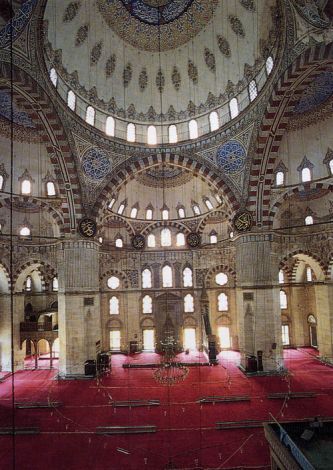ORHAN VELİ KANIK (1914-1950)
Orhan Veli Kanık was born on April 13, 1914 in Istanbul. He wrote under various pen names including Mehmet Ali Sel and Adil Hanlı.
He started his educational life at the Lycée de Galatasaray in Istanbul, and later attended the Department of Philosophy of Istanbul University. However, he never completed his university education and eventually became a civil servant. For some time, he worked for the Turkish Postal Service and for the Translation Department of the Ministry of National Education.
However, his dissatisfaction with the work environment, which he found undemocratic, led him to resign and to dedicate himself to a life of literature. In 1949, he started publishing the biweekly Yaprak, but financial difficulties caused him to discontinue the periodical. Orhan Veli Kanık’s poetry and prose also appeared in various other publications including İnsan, Ses, Gençlik, Küllük, and İnkılapçı Gençlik. But his most important contribution to literature was the preface that he wrote for the poetry volume entitled Garip, which he co-published with fellow poets Oktay Rifat and Melih Cevdet Anday. This piece came to be considered as the manifesto that launched the groundbreaking “Garip” movement of the 1940s. It was mainly a rebuttal of “poetic-ness” and it criticized the efforts of establishing connections with traditions or to use Kanık’s own term, with “the Grandmas.” Instead, the “Garip” movement advocated the use of familiar, daily language in the composition of poetry.
Orhan Veli stated, “I hope that similes, metaphors, exaggerations and the richness of imagination that emerges from the combination of these have satisfied the hungry eyes of history” and in his manifesto, he rejected traditional forms. Furthermore, he thought that poetry had until then appealed to the taste of the prosperous and privileged classes, that it had been the slave of religion, of feudal upper classes, and of the bourgeoisie. Orhan Veli believed that poetry should not be an art form to be only appreciated by a particular class, but that it should appeal to all citizens of the world. This is what Orhan Veli says about meaning in poetry: “words, which are the building blocks of language, are either the direct expressions of objects, or the expressions of our ideas. It would seem that minds that develop abstract ideas are not connected with the external universe. In reality, the creature called human has a predilection to approach even the most abstract idea in concrete terms, in other words, a tendency to give priority to the substance, to the object.” According to this new understanding of poetry, neither rhyme nor lyricism were enough for individuals who had sufficiently benefited from traditional poetry. Orhan Veli believed that poetic composition was “the act of going through the human subconscious in order to locate the most pure, and the simplest poetry,” and hence it no longer needed any formulaic forms and habits. In the initial stages of the Garip movement, Kanık and his fellow poets were avant-guardists because they refused to connect with tradition. Orhan Veli Kanık also opposed the idea of de-emphasizing the meaning of words taken from daily language, because he thought that differentiating the syntax of poetic language from familiar language would cause poetry to be artificial; he stated that a separate “poetic language” did not exist. Through this argument, Orhan Veli opposed the main principle of modern poetry and took a stance against modernity itself, which means that he could be considered an avant-gardist. The poems of the Garip movement remained popular until Orhan Veli’s death, which came after a tragic accident. He died on November 14,1950.
Orhan Veli Kanık’s Works:
Poetry: Garip (Strange, with Oktay Rıfat ve Melih Cevdet Anday, 1941; only his poems, 1945), Vazgeçemediğim (My Inability to Give Up, 1945), Destan Gibi (Like an Epic, 1946), Yenisi (Of the New, 1947), Karşı (Against, 1949), Kanık Bütün Şiirleri (All Poems of Orhan Veli, collected posthumously including poems that were not previously published in his books, 1951; 23rd edition, with corrections, 1987), Çeviri Şiirleri (Translated Poems, 1982).
Other Works: La Fontaine'nin Masalları (Tales from La Fontaine, 2 volumes, 1943), Nasrettin Hoca Hikâyeleri (Stories of Nasreddin Hoca, 1949), Kanık/ Nesir Yazıları (Kanık/ Prose, 1953; with the title Denize Do�?ru/Toward the Sea, 1970), Şevket Rado'ya Mektuplar (Letters to Şevket Rado, edited by Emin Nedret İşli, with Oktay Rifat and Melih Cevdet Anday, 2002).
* Biographical information concerning Orhan Veli Kanık has been gathered from Tanzimat’tan Bugüne Edebiyatçılar Ansiklopedisi.
Sources: Bilkent University, Turkish Literature Deparment, Class Notes.
Reference: Yesim Gokce (Bilkent University)/Turkish Cultural Foundation, photograph courtesy of Ara Guler.
Some selected examples (please click on pictures to enlarge):









